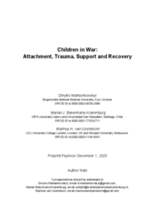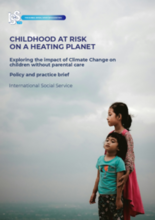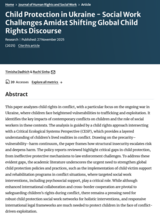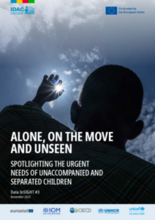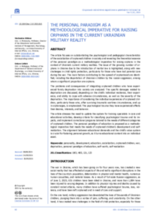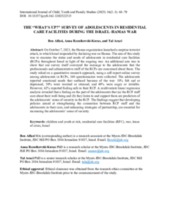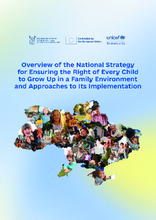Displaying 1 - 10 of 532
This article investigates the deinstitutionalisation of children with disabilities in times of armed conflict, taking the situation in Ukraine as a case study. It argues that a proper implementation of the right to independent living involves adopting a human rights-based approach that considers all the socio-economic rights of children with disabilities with due regard for the knowledge and expertise existing within families.
The report analyses existing parenting support policies, programmes and service models relevant to child protection and care reform. Drawing on international evidence and national sources, the review highlights the role of parenting support in preventing family separation, strengthening caregiving capacities and improving child well-being across the life course.
This paper explores the lived experiences of Bhutanese unaccompanied and separated refugee children living in camps in eastern Nepal, examining how they navigate prolonged displacement, statelessness, and institutional neglect through ethnographic and narrative methods. It argues that these children exist in a “state-of-nowhere,” rendered politically and administratively invisible within refugee governance systems, and calls for rights-based, child-centred responses that address the structural and epistemic violence shaping their exclusion.
War negatively affects adults’ mental and physical health, which in turn impacts their parenting, exposing children to both direct and indirect stressors. This book examines these consequences, using evidence-based research and case studies from the Russian-Ukrainian war to highlight the importance of attachment, trauma-informed support, and interventions for families during and after conflict.
Climate change is increasingly recognized as a child rights crisis, with children without parental care being particularly vulnerable to its impacts. This brief highlights how climate change heightens risks of losing parental care, creates unaccompanied children, and disrupts alternative care systems, and it offers recommendations for policymakers and practitioners to prevent separation and protect these children.
This paper analyzes child rights in conflict, with a particular focus on the ongoing war in Ukraine, where children face heightened vulnerabilities to trafficking and exploitation. It identifies the key impacts of contemporary conflicts on children and the role of social workers in these contexts.
This brief by the International Data Alliance for Children on the Move (IDAC) calls for urgent global action to close these data gaps and strengthen evidence-based policies that uphold the rights of unaccompanied and separated children. Based on a 2025 literature review of more than 200 sources, it identifies key trends by age, gender, migration status and route, and other variables.
This article examines the socialization and education of orphaned children in Ukraine amid the war, highlighting the psychological trauma, deprivation, and social challenges they face. It calls for reforms in caregiver training, trauma-informed education, and the adoption of a personal paradigm approach that supports each child’s development, resilience, and self-realization.
This study surveyed 340 adolescents in residential care facilities across Israel to assess their emotional well-being and sense of security during the Israel–Hamas war. Findings show high levels of sadness, stress, and anger among youth, but those who felt cared for and supported by staff reported greater security, underscoring the need to strengthen staff–adolescent relationships during crises.
The document presents Ukraine’s ongoing child protection reform, known as the Better Care for Every Child initiative, which focuses on shifting from institutional to family- and community-based care. It outlines the key priorities of the National Strategy on Deinstitutionalization, including early identification of vulnerabilities, family support services, inclusive education, and the development of quality alternative care.


